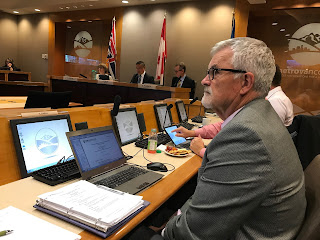 |
| At Metro board meeting last week. |
Under the allocations associated with the 2011 census, the
board comprised 38 directors holding among them 129 votes. With the population increases
over the ensuing five years, several communities (but not Coquitlam, however)
hit thresholds that entitled them to more voting strength, with all votes now
totalling 134; two communities (Surrey and Delta) became entitled to a new
director, the number of which will now total 40 sitting at the Metro board.
But here’s the thing: even though Coquitlam’s per-capita
growth was very high, and overall population grew by almost 13,000 to 139,338,
it didn’t reach a new threshold, so it gained neither voting strength to add to
its seven votes (divided four and three between its two directors) nor a new
director.
The bottom line is this: in 2011, Coquitlam had 5.4% of the
region’s population and enjoyed 5.4% of Metro’s vote allocation and 5.3% of its
directors. Today, our population represents 5.65% of the region’s total, but
our voting strength has dropped to 5.2% of all votes and our percentage of
directors has dropped to 5%. Doesn't seem fair, does it? But, as I said at the outset, it's just a quirk.
That's why I didn’t raise this at the recent board meeting I attended
as the mayor’s alternate, but I did raise the issue of the open-ended nature of
the system, which sets no ceiling on the number of directors sitting on the
board; instead, directors keep being added as population thresholds are
met. This struck me as rather
inadequate, given the expected 1-million-person growth the region will see by
2040.
In response to my questions on the matter, I was told that
the system is under review internally, which is very good news. Any new proposal for a ceiling or other
amendments will have to go to the province for approval.
For the full Metro report on this issue, please click here and navigate to page 274 of the document.
No comments:
Post a Comment